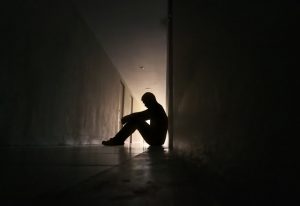Abuse-Related Depression in Nursing Homes
 Depression is an invisible illness because you can’t always see the impact it has on a person. Yet, depression can cause both mental and physical pain.
Depression is an invisible illness because you can’t always see the impact it has on a person. Yet, depression can cause both mental and physical pain.
Too often, the signs of depression are brushed off or missed altogether. However, depression can be triggered by an abusive situation. Unfortunately, depression is common in nursing home abuse and neglect victims. Identifying abuse-related depression in nursing homes is not always easy, but Chris Hudson Law Group can help.
At Chris Hudson Law Group, we know depression is not an easy topic to talk about. However, recognizing the signs of this troubling disorder can help spare your loved one the pain of living in an abusive or neglectful situation. Our goal is to help your family member live out their golden years in peace. If you suspect abuse or notice signs of depression in your loved one, get in touch with the team at Chris Hudson Law Group by calling (706) 863-6600.
What Is Depression?
Depression is a mood disorder that can impact how a person feels and thinks. Generally, depressive symptoms must last for at least two weeks before a clinical diagnosis of depression can be made. Depression has become synonymous with feeling down or blue. However, depression is much more than just feeling sad. Depression can change how a person thinks, feels, and behaves. It can also cause disruptions to everyday activities like sleeping, eating, and interacting with others.
Although depression is a fairly common mood disorder in older adults, the National Institute on Aging does not consider depression a “normal” part of aging. If an elderly individual is suddenly experiencing symptoms of depression, it may be because of a medical condition, stress, or changes in their environment. Depression can also be caused by the trauma of nursing home abuse or neglect.
Types of Abuse That Can Trigger Depression
 Nursing home abuse can run more than just skin deep. Physical abuse generally comes to mind when you hear the word “abuse.” Yet, several forms of abuse can impact the mental health and well-being of elderly residents. Types of abuse that may trigger depression in nursing home residents can include:
Nursing home abuse can run more than just skin deep. Physical abuse generally comes to mind when you hear the word “abuse.” Yet, several forms of abuse can impact the mental health and well-being of elderly residents. Types of abuse that may trigger depression in nursing home residents can include:
- Physical Abuse – Physical abuse includes physical violence inflicted on a nursing home resident, like kicking, hitting, slapping, biting, or shoving. Although physical abuse can leave bruises and scars, it can also cause elderly residents to suffer from depression. Elderly residents may feel powerless to stop the attacks. This can lead to mental distress, anxiety, and depression.
- Psychological Abuse – Depression is often a sign of psychological or emotional abuse. Emotional abuse occurs when a caregiver causes mental distress to a resident through verbal threats, intimidation, social isolation, humiliation, or degrading or derogatory language.
- Sexual Abuse – Sexual abuse is any unwanted sexual contact between a resident and a caregiver. Examples of sexual abuse include rape, sexual touching, forced nudity, forcing a resident to take sexually explicit pictures, or forcing a resident to watch sexually explicit material. Victims of sexual abuse often feel shame, isolation, and guilt that can spiral into depression.
- Financial Abuse – Financial abuse occurs when a nursing home caregiver exploits a resident for financial gain either by theft or through a financial scheme. Financial abuse can lead to depression in the elderly. However, depression generally occurs after the caregiver is caught and the resident realizes the scope of their losses. Most caregivers actively engaging in financial abuse are careful to cover their tracks so they can continue to gain financial benefits without the resident realizing something is amiss.
Signs and Symptoms of Depression
Depression in older adults can be more challenging to pinpoint. Signs of the illness may look different in older people. Plus, if your family member is in a nursing home, you may not see them as regularly as you once did. Without regular contact, detecting the signs of depression can be challenging. Try to stay in touch with your loved one and ask for help if you notice any of the following symptoms of depression:
- Persistent sad feelings
- Fatigue
- Feelings of hopelessness, worthlessness, or guilt
- Changes in eating patterns
- Changes in sleeping patterns
- Difficulty sleeping
- Irritability
- Loss of interest in pleasurable activities or hobbies
- Loss of interest in friends and family
- Problems concentrating
- Thoughts of suicide
If you notice any troubling signs, talk to your family member, and encourage them to discuss their symptoms with their physician.
Help for Depression
Stopping the abuse or neglect of your loved one will go a long way toward helping relieve their symptoms of depression. However, continued medical care may be necessary. Antidepressants can be one way to help manage the symptoms of depression. However, certain antidepressants are not recommended for those with cognitive conditions like dementia or Alzheimer’s disease.
Psychotherapy can also help nursing home residents cope with depression. A mental health professional will also be able to offer strategies that can help your loved one manage the negative emotions associated with being in an abusive situation.
If you believe that your family member is suicidal and needs immediate assistance, consider these resources:
- National Alliance on Mental Health- Georgia
- Georgia Department of Behavioral Health – Suicide Prevention
Contact an Experienced Augusta Nursing Home Abuse and Neglect Attorney Now
Nursing home abuse and neglect can impact a loved one physically and mentally. Depression doesn’t just affect the mind. It can also cause physical signs, such as weakness and fatigue, and may compromise the immune system. Get your family member the help they need now and talk to an experienced nursing home abuse attorney from Chris Hudson Law Group.
At Chris Hudson Law Group, we are dedicated to treating your family member with dignity. They deserve compensation for their injuries and to live out their golden years in safety. We want to help you give your loved one the life they deserve.
Contact our office at (706) 863-6600 to set up a free and confidential legal consultation. We take your concerns seriously and will do everything in our power to hold negligent nursing homes and caregivers accountable for their actions.
